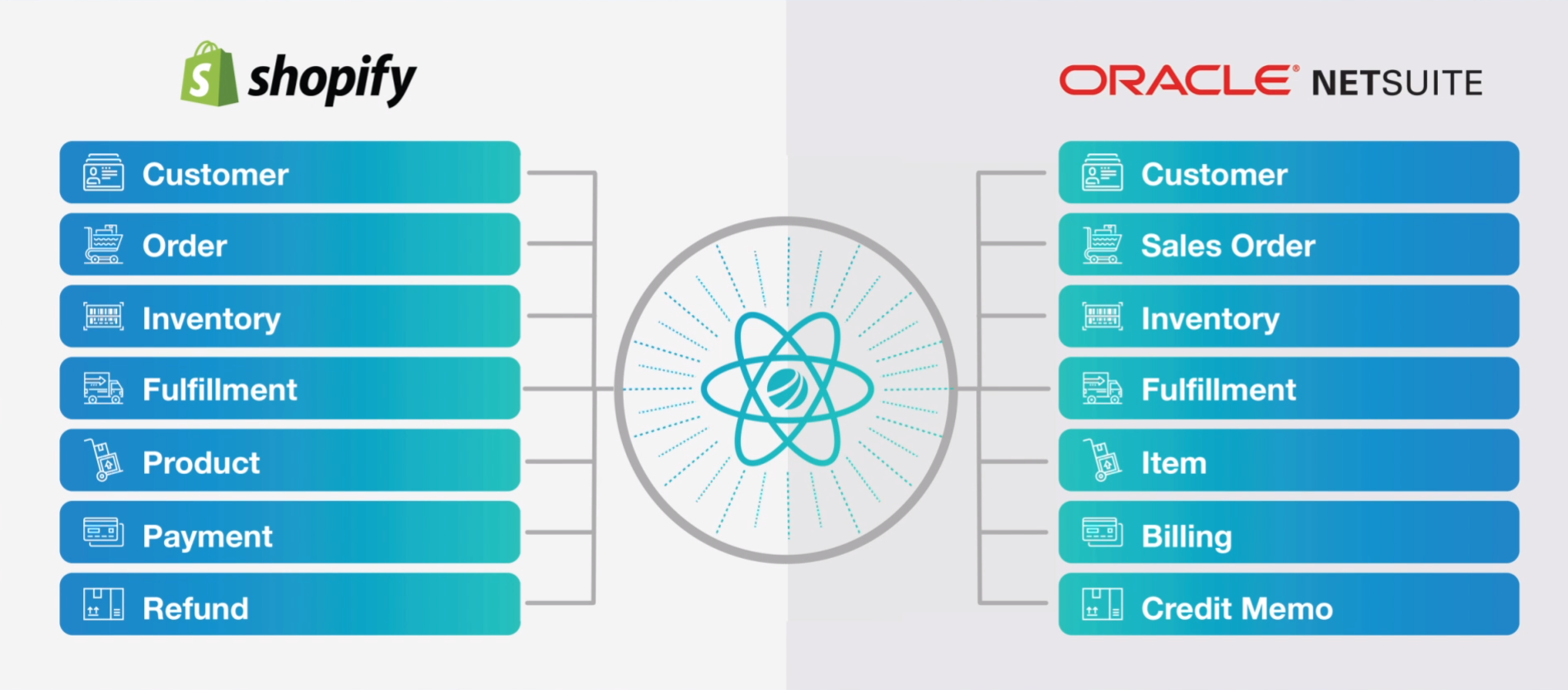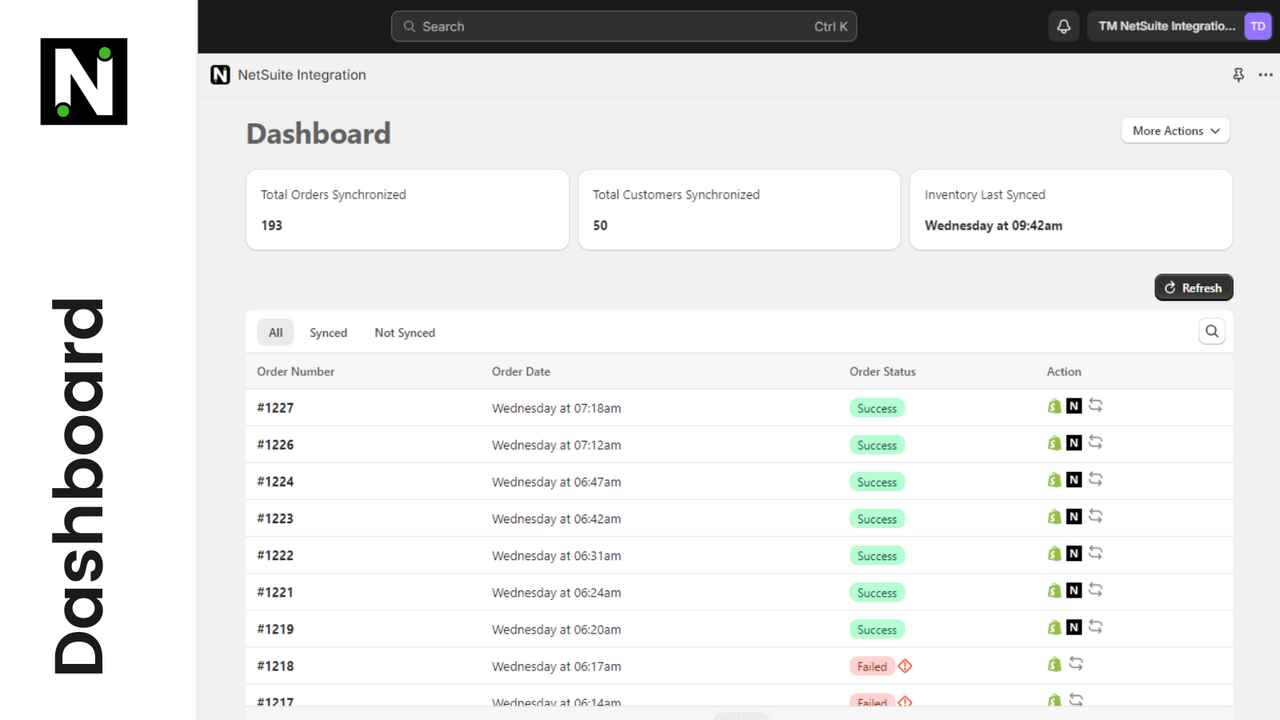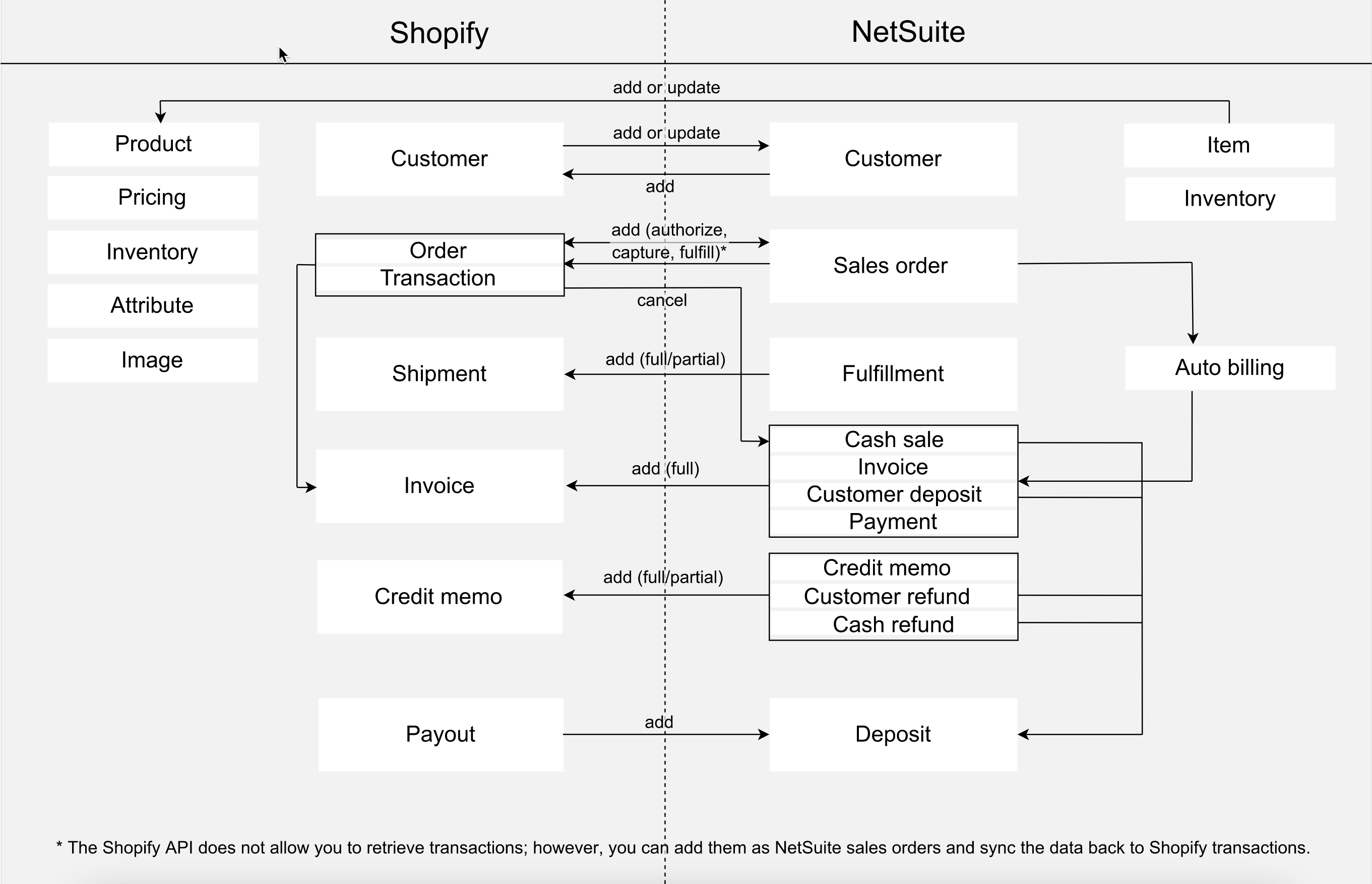Integrating Shopify with NetSuite streamlines operations. It enhances efficiency for businesses.
This powerful integration merges e-commerce with enterprise resource planning. It offers a seamless connection between online stores and backend management systems. This combination simplifies inventory control, order management, and customer data syncing. Businesses gain real-time insights into their operations. This helps them make informed decisions quickly.
With Shopify and NetSuite working together, companies can automate workflows. They reduce manual tasks and errors. This integration supports scalability. It adapts to growing demands without additional complexity. Shopify and NetSuite create a unified platform. It fosters improved customer experiences and operational excellence. Discover how this integration can transform your business processes. Learn how it enhances productivity and supports growth. Explore the benefits of merging these technologies for your e-commerce success.
Table of Contents
ToggleIntroduction to Shopify and Netsuite

Credit: gurussolutions.com
In the fast-paced world of e-commerce, having the right tools to streamline operations is crucial. Shopify and NetSuite have emerged as leaders in their respective fields, offering powerful solutions to help businesses grow. Integrating these two platforms can enhance efficiency, improve data management, and boost your online store’s performance. Understanding how these systems work individually is the first step to leveraging their combined power.
Overview of Shopify Features
Shopify is a popular e-commerce platform known for its user-friendly interface and robust features. It allows you to set up an online store quickly, providing customizable templates and easy product management.
With Shopify, you can integrate payment gateways, manage inventory, and use various marketing tools. Its simplicity makes it ideal for both small businesses and large enterprises looking to expand their online presence.
Shopify also offers analytics tools to help you understand your customer base. By analyzing sales data, you can make informed decisions to optimize your store’s performance.
Netsuite Capabilities
NetSuite is a comprehensive business management suite known for its ERP (Enterprise Resource Planning) capabilities. It offers modules for financial management, CRM, inventory, and more.
Businesses use NetSuite to streamline operations, automate processes, and manage data across various departments. Its real-time analytics help you monitor performance and identify growth opportunities.
NetSuite’s ability to integrate with other platforms makes it a valuable tool for businesses seeking scalability. The software’s adaptability ensures it meets your specific needs, whether you’re managing finances or customer relationships.
Have you ever considered how these features can be combined for maximum impact? By integrating Shopify with NetSuite, you can unify your e-commerce operations and back-office processes, creating a seamless flow of information. This integration can transform your business operations, making them more efficient and data-driven.
What challenges have you faced in managing your e-commerce store? How do you think integrating Shopify with NetSuite could address these issues? Reflect on these questions and explore the possibilities for your business.
Benefits of Integration
Boost efficiency with Shopify and Netsuite integration. Automate data transfer, reducing errors and saving time. Streamline operations and improve customer satisfaction with seamless inventory and order management.
Integrating Shopify with Netsuite can significantly enhance your business operations. By merging these two powerful platforms, you can experience a smoother workflow, improved data management, and increased efficiency. This integration not only simplifies processes but also boosts your business’s ability to make informed decisions. Let’s delve into the benefits that come with this integration and how it can transform your business.
Streamlined Operations
Imagine a world where you don’t have to manually update inventory levels or customer data. With Shopify and Netsuite integration, your operations become seamless. You can automate tasks like order processing, inventory tracking, and financial reporting. This automation saves time and reduces errors. Have you ever felt overwhelmed by the sheer amount of manual work required? With integration, that stress is alleviated. Your team can focus on strategic tasks rather than mundane updates. This shift allows for better productivity and more innovative thinking.
Enhanced Data Accuracy
Data accuracy is crucial for any business decision. When Shopify and Netsuite integrate, you minimize discrepancies between systems. This ensures that your data is consistent and reliable, giving you a clearer picture of your business’s health. Imagine making decisions based on outdated or incorrect data. It’s risky and can lead to costly mistakes. Integration helps eliminate such risks by synchronizing your data in real-time. You can trust your reports and insights, making confident decisions that drive growth. How often have you questioned the reliability of your reports? With enhanced data accuracy, those concerns are history. Your data becomes a solid foundation for strategy, planning, and development. This accuracy empowers your business to thrive in a competitive market. This integration isn’t just a technical improvement; it’s a strategic advantage that can propel your business forward. How will you leverage this integration to enhance your operations and data accuracy? The choice is yours, and the benefits are waiting.
Setting up the Integration
Integrating Shopify with Netsuite streamlines operations by syncing data like inventory and orders. This setup enhances efficiency and helps businesses manage both platforms seamlessly. It’s a straightforward process that saves time and reduces errors.
Setting up the integration between Shopify and Netsuite can streamline operations. This process ensures efficient data flow between your eCommerce platform and ERP system. Proper setup leads to better inventory management, customer data synchronization, and order processing. Follow the steps below for a smooth integration.
Initial Requirements
Before starting, ensure you have admin access to both platforms. You need a stable internet connection for the integration process. Check that both Shopify and Netsuite accounts are active and updated. Gather necessary API keys and credentials. Without these, the integration cannot proceed. Make sure your Netsuite account supports integration features. Verify your subscription plan allows external integrations.
Step-by-step Installation
Begin by logging into your Shopify admin panel. Navigate to the “Apps” section and search for integration tools. Choose a reliable app for Netsuite integration. Install the app following on-screen instructions. Enter your Netsuite credentials when prompted. Connect your Netsuite account to the app securely. Configure settings to match your business needs. Test the integration with sample data. Ensure data syncs correctly between platforms. Monitor for errors or discrepancies. Adjust settings if any issues arise. Regularly update both platforms for optimal performance.
Customizing Your Integration
Customizing your Shopify integration with NetSuite can boost your business operations. Tailoring the integration ensures it fits your unique business needs. This flexibility allows businesses to streamline processes effectively. Personalized settings and advanced customization options provide greater control. Let’s explore how you can customize your integration.
Personalizing Settings
Personalizing settings lets you manage data flow between Shopify and NetSuite. You can choose which data syncs and how often. This ensures information is accurate and up-to-date. You might want to sync orders, customers, or inventory. Adjusting these settings helps maintain a smooth operation. Personalization aligns your integration with specific business goals.
Advanced Customization Options
Advanced customization options offer deeper integration control. You can create custom scripts to automate tasks. This might include order processing or inventory updates. Advanced options require a bit of technical knowledge. They provide the flexibility to meet complex business needs. With these tools, the integration becomes a powerful asset.
Common Challenges and Solutions
Integrating Shopify with Netsuite offers many benefits for businesses. Yet, it can present challenges that require smart solutions. Understanding these obstacles helps enhance efficiency and productivity. Tackling common issues ensures smooth operations between platforms.
Troubleshooting Integration Issues
Integration issues may arise due to data mismatches. Incorrect field mapping can lead to data errors. Double-check field mappings for accuracy. Ensure both systems share compatible data formats. Regularly update software versions to avoid conflicts. Communication between teams is vital for resolving integration hiccups.
Optimizing Performance
Slow performance can impact business operations. Optimizing performance is crucial for seamless integration. Monitor system load to identify bottlenecks. Implement caching to reduce load times. Use efficient coding practices to streamline processes. Regularly audit integrations to ensure optimal performance.

Credit: apps.shopify.com
Case Studies
Explore how integrating Shopify with Netsuite enhances business efficiency. This connection streamlines operations, ensuring seamless data flow between platforms. Ideal for businesses seeking smooth inventory management and order processing.
In the world of e-commerce, integrating Shopify with NetSuite has become a game-changer for many businesses. To truly understand the potential of this integration, let’s explore some real-world case studies. These stories highlight the successes and challenges faced by businesses, offering you valuable insights for your own integration journey.
Successful Shopify-netsuite Integrations
Many businesses have unlocked new levels of efficiency and growth through successful Shopify-NetSuite integrations. One notable example is a mid-sized fashion retailer. They managed to streamline their inventory management, resulting in a 30% reduction in stock discrepancies. With Shopify handling front-end sales and NetSuite managing backend operations, they saw improved order accuracy and quicker fulfillment times. This integration allowed them to focus on expanding their product line, confident in their ability to meet increased demand. Another success story comes from a gourmet food company. By integrating Shopify with NetSuite, they automated order processing, which reduced manual errors and saved countless hours. This seamless operation led to a 20% increase in sales during peak seasons, as their team could focus on marketing rather than troubleshooting backend issues.
Lessons Learned
These success stories offer a treasure trove of lessons. The first lesson is the importance of thorough planning. Before jumping into integration, assess your current processes and identify areas that need improvement. Secondly, consider the role of customization. Each business has unique needs, so tailor the integration to fit your specific requirements. This approach ensures that both Shopify and NetSuite work harmoniously to support your business goals. Finally, invest in training your team. A well-trained team can maximize the benefits of integration, reducing downtime and enhancing productivity. Are you ready to empower your team to harness the full potential of this integration? With these insights from real-world cases, you can approach your Shopify-NetSuite integration with confidence. Whether you’re looking to improve inventory management or enhance customer experience, these lessons will guide you towards a successful integration.
Future Trends in Integration
The future of integration between Shopify and Netsuite is promising. As technology evolves, new trends emerge that shape e-commerce strategies. Businesses seek seamless integration solutions to enhance operations and boost customer experiences. These future trends will influence how Shopify and Netsuite integrate, offering new opportunities for growth and efficiency.
Emerging Technologies
Artificial intelligence will play a significant role in integration. AI automates routine tasks, improving efficiency and accuracy. Machine learning enhances data analysis, providing deeper insights into customer behavior. Businesses can use these insights to personalize marketing strategies.
Blockchain technology offers secure data transactions. It ensures privacy and integrity in data exchange between platforms. As e-commerce grows, security becomes more crucial. Blockchain helps maintain trust in online transactions.
Cloud computing facilitates better integration. It offers scalability and flexibility. Businesses can adjust resources based on demand, reducing costs and improving performance. The cloud enhances data accessibility, ensuring seamless operations across platforms.
Predictions for E-commerce
Mobile commerce will continue to rise. More consumers shop using smartphones. Integration must support mobile optimization to capture this trend. Faster loading times and simplified checkout processes will be essential.
Personalization will dominate e-commerce strategies. Integration can provide personalized shopping experiences. Data from Netsuite helps tailor product recommendations on Shopify. This enhances customer satisfaction and loyalty.
Sustainability will influence e-commerce decisions. Eco-friendly practices are becoming important for consumers. Integration can support sustainable supply chain management. Businesses can track and reduce environmental impacts effectively.
Omnichannel strategies will gain importance. Consumers expect consistent experiences across channels. Integration ensures data synchronization, enhancing customer interactions. Seamless shopping experiences boost sales and brand reputation.

Credit: www.jobinandjismi.com
Frequently Asked Questions
Can Shopify Integrate with Netsuite?
Yes, Shopify can integrate with NetSuite. This integration syncs inventory, orders, and customer data efficiently. Use third-party apps or APIs for seamless connection. Boost your e-commerce operations with this powerful integration to streamline processes and improve business management.
How Do I Sync My Shopify Payout Report with Netsuite?
To sync Shopify payout reports with NetSuite, use a third-party integration tool like Celigo or FarApp. Install the connector, configure settings, and map fields. Ensure data flows smoothly for accurate financial reporting. Regularly update integration settings to handle new Shopify and NetSuite features.
Who Does Shopify Integrate With?
Shopify integrates with various platforms like Facebook, Instagram, Amazon, and eBay. It also connects with payment gateways such as PayPal, Stripe, and Square. Shopify supports marketing tools like Google Analytics and Mailchimp, as well as shipping services like UPS, FedEx, and DHL.
How Do I Integrate with Netsuite?
Integrate with NetSuite using SuiteTalk Web Services or SuiteScript. Utilize RESTlets for custom APIs. Ensure proper authentication. Consult NetSuite documentation for detailed steps. Consider hiring a NetSuite consultant for complex integrations. Optimize data mapping for seamless communication. Use middleware tools for simplified integration processes.
Conclusion
Integrating Shopify with Netsuite simplifies your business operations. It improves data management efficiency. Sales tracking becomes effortless and accurate. Inventory updates happen in real-time, reducing errors. Customer service gets better with seamless order processing. Time saved means more focus on growth.
Ease of use makes everyday tasks manageable. Syncing systems ensures reliable information flow. Better insights help make informed decisions. The integration supports scalability as your business expands. Choose Shopify and Netsuite for smoother workflows. Boost productivity without complex setups. Experience enhanced business management today.




